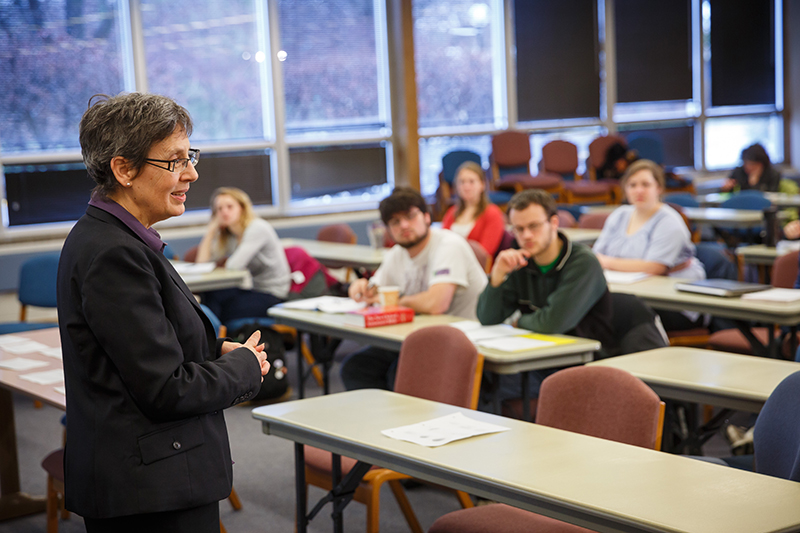The Bible, religion and philosophy department is changing due to a low number of students and budget cuts.
The Bible, Religion and Philosophy department has experienced budget and personnel cuts in the past year due to a declining number of students in the department, a trend seen beyond Goshen College in the larger collegiate atmosphere.“Just logic dictated that if you’re going to cut back, you want to have the least negative effect on the students, so the decision [to cut] was a very rational one,” Jo-Ann Brant said. “All across the country there has been a decreasing number of students taking courses in religion. That, in part, seems to be because of an increase in students feeling the need for practicality… religion is still valued but seen as not as marketable.”
This broader social trend may have decreased the numbers of students taking classes in the BRP department, but has not affected the passion these students have for the content of their classes or the program as a whole.
“I think that the classes in the BRP department have some of the most important subject matter offered at GC,” Peter Paetkau, a sophomore and one of the three Bible and Religion majors, said. “This is not to say that everyone should be in BRP or everyone should be Christian or should be reading their Bible daily. It is to say that this department at its core is devoted to looking at questions that are essential to be asking. While the classes are about increasing one’s knowledge of a topic, they are also a constant challenge to reexamine, affirm or move away from beliefs for people both within and outside of the church.”
The current professors within the department that facilitate these challenging, conceptual discussions within BRP classes include Keith Graber Miller, Jo-Ann Brant, Paul Keim and Regina Shands Stoltzfus. The course offerings have moved to an alternating cycle with an emphasis on offering classes to promote the minors within the department, including minors in Bible and religion, philosophy, theological studies, and Christian ministries.
“Beginning last year, we started thinking about how we should respond programmatically to the shifting situation, and so we’ve really placed much more focus on minors,” Brant said. “If students really want to focus on something that they see as being more immediately obvious as a vocational program, but still have a real interest in religion, they are much more likely to take the minor, and it will still serve them well.”
However, the classes offered as part of the major or minors are applicable beyond the students who have officially declared. These classes compose portions of the Goshen Core that allow students from all disciplines to experience the richness within the Bible, Religion and Philosophy department. Exposure to this department through the Core has opened some students’ eyes to the prospect of continuing in this area.
“Students tend to get here before they know that’s a major they want,” Regina Shands Stoltzfus, a BRP and PJCS professor, said. “Some students do come in knowing this is the area that they want, but some students either haven’t thought about it or haven’t been exposed to the study of religion and Bible and find that along the way. What needs to happen is that we shine the light on those places and our students.”
The BRP department has had a tumultuous year of change and painful transition, but is optimistic in looking ahead to a future of student-professor relationships that wrestle with deep human issues in ways that allow for growth on an individual and community basis.
“The professors in this department are willing to wrestle with key questions with their students, questions dealing with ethics, Biblical interpretations, history and how it all relates to us,” Paetkau said. “We are lucky to have the profs that we do. I think that this is a place that is constantly challenging students and faculty both academically and in broader ways, which is so important to have in a formal education setting.”

